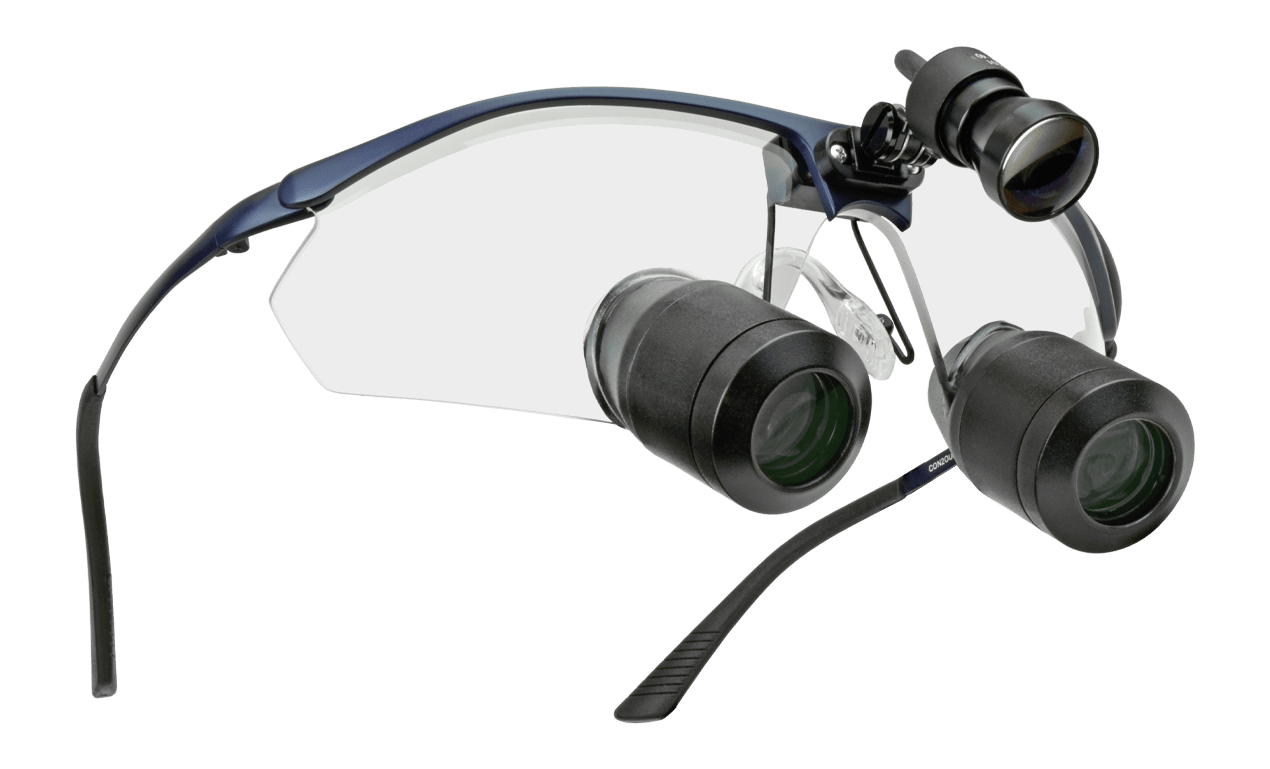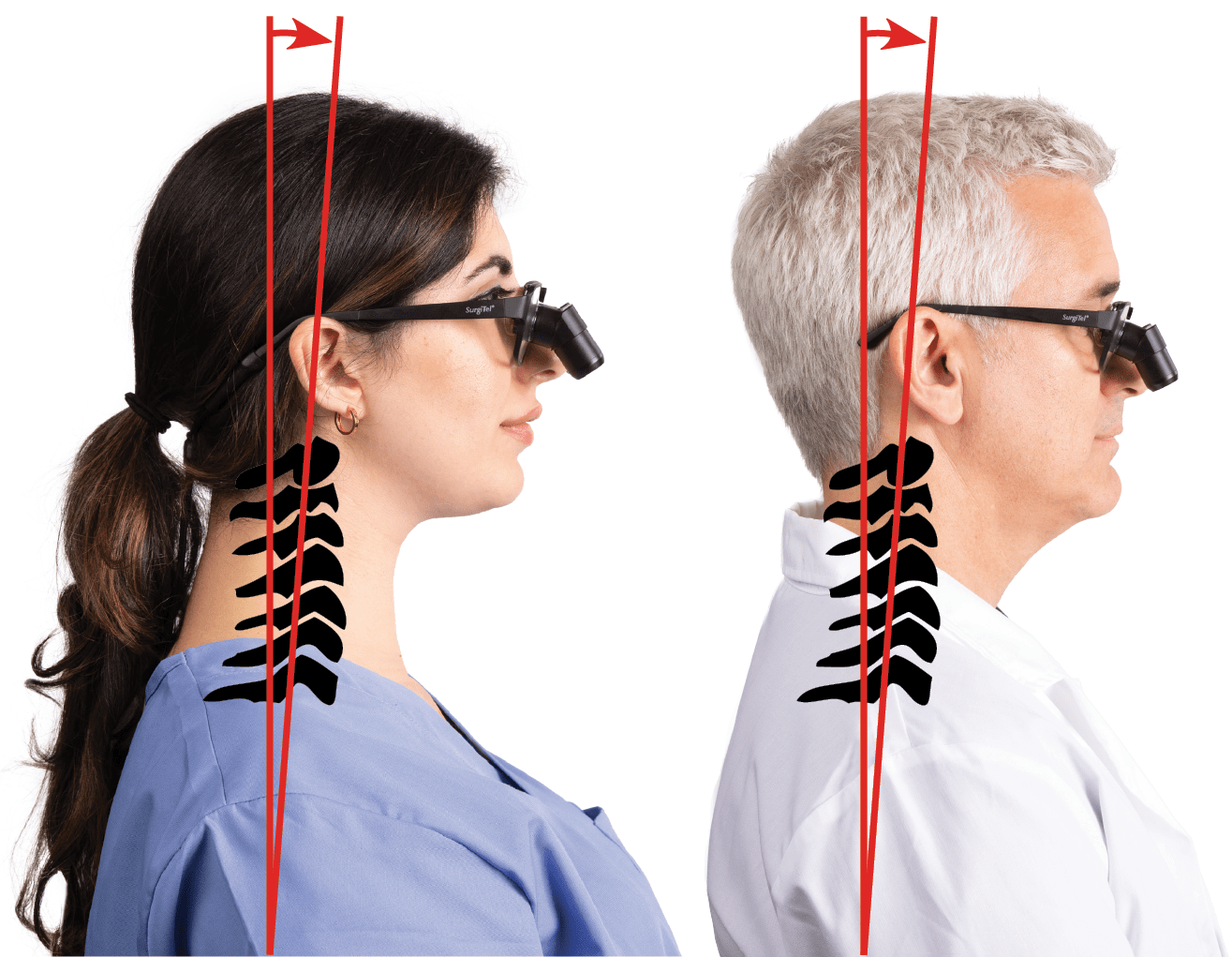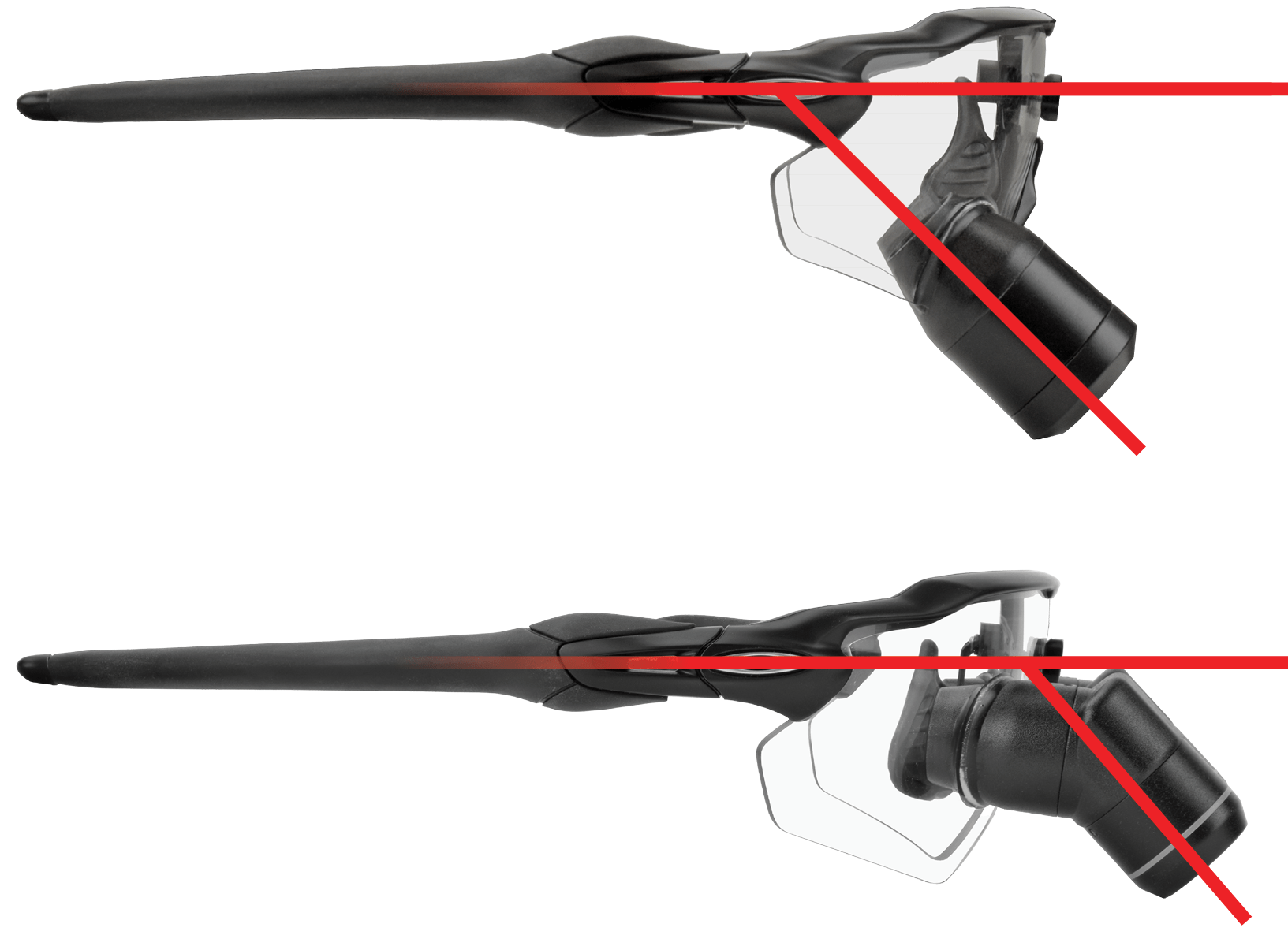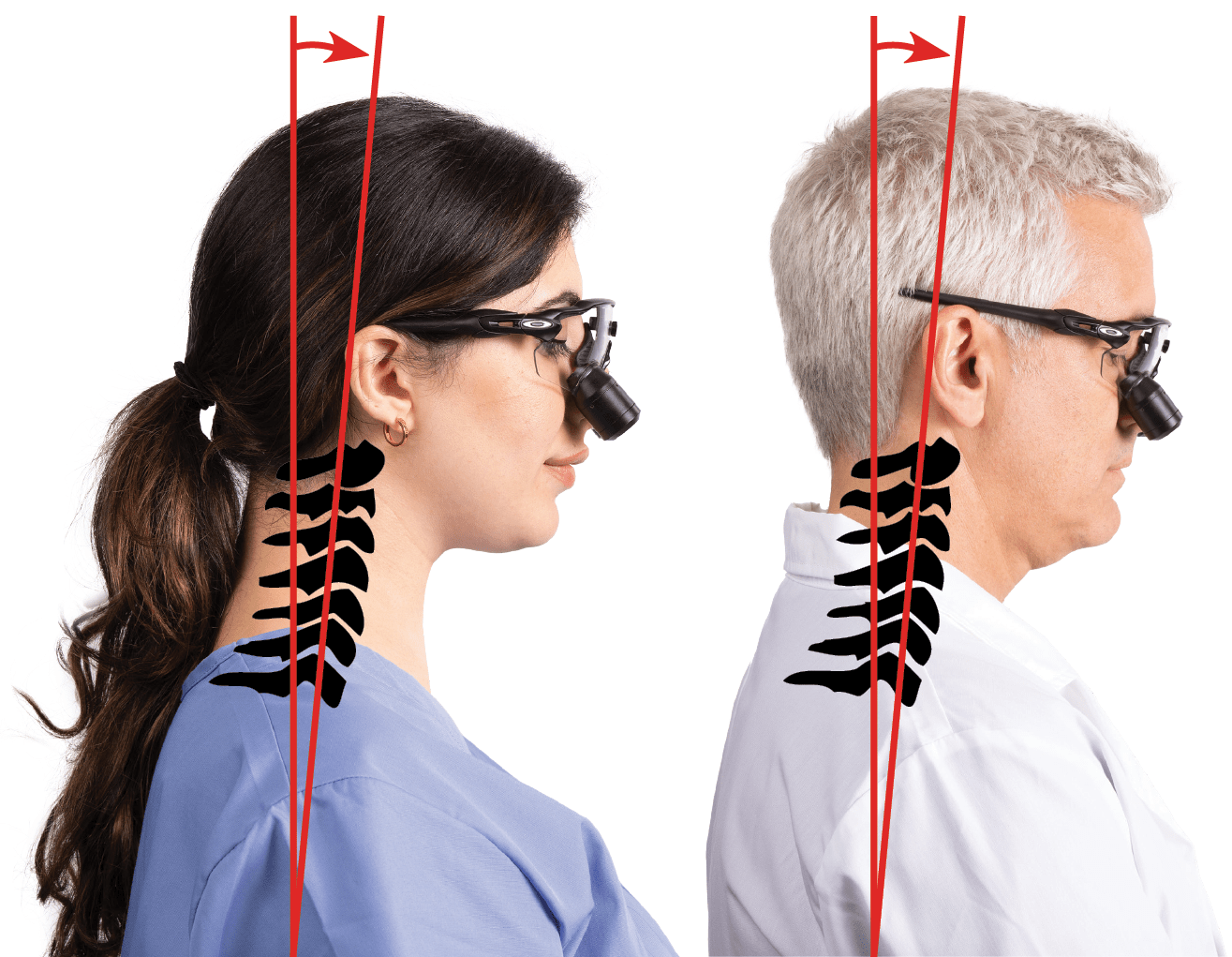SurgiTel’s Hybrid Ergo™ Loupes: Best of Ergonomics and Direct Vision

ErgoPractice News – Nov/Dec 2023
By Jin Chang PhD
jchang@surgitel.com
Summary
SurgiTel’s Hybrid Ergo™ loupes incorporate our patented suspended magnification technology by positioning magnification oculars at the lowest point within a rimless bottom frame. This strategic placement, combined with the pantoscopic tilt of our lenses, creates an ergonomic loupe with a steep declination angle that is comparable to a deflection “ergo” loupe (see Figure 4). The suspended magnification and pantoscopic tilt also help clinicians to work comfortably, precisely, and with reduced musculoskeletal strain.
What are SurgiTel’s Hybrid Ergo™ Loupes?

Figure 1: Example of SurgiTel’s patented suspended magnification.
SurgiTel’s Hybrid Ergo™ loupes are distinguished by our proprietary suspended magnification technology. This innovative feature involves securing the magnification oculars at the lowest point within a rimless bottom frame, as illustrated in Figure 1.
The key to SurgiTel’s suspended magnification technology lies in its strategic placement of the magnification oculars. By positioning them at the lowest point within the lens structure, the loupe achieves a unique and advantageous optical configuration. This design contributes significantly to achieving a more pronounced declination angle.
The pantoscopic tilt of SurgiTel’s frames further complements the suspended magnification technology. Pantoscopic tilt refers to the angle at which the loupes are inclined towards the user’s face. This tilt, when combined with the suspended magnification design, contributes to creating an ergonomic loupe that allows for a comfortable and natural head tilt during dental procedures.
The result of these combined innovations gives SurgiTel’s Hybrid Ergo™ loupes a notably steep declination angle. This angle is crucial for ensuring that clinicians can maintain a relaxed and sustainable posture during extended periods of use, reducing the risk of musculoskeletal strain and fatigue. The ergonomic benefits of SurgiTel’s Hybrid Ergo™ loupes are particularly significant in dental practices where precision and comfort are paramount.
Frame Options
Currently, SurgiTel’s Hybrid Ergo™ loupes are available with three frame models—the Oakley Radar EV, SurgiTel Con2our frames and Ergo Max 2. If you’re looking for a lightweight frame the Oakley Radar EV and Con2our are the way to go. The SurgiTel Ergo Max 2.0 is a sturdy frame ideal for higher magnifications (can support the 8.0x and 10.0x oculars) and has the option to include an Rx in the carrier lens. The limitation to these three frames arises from the requirement of a rimless bottom frame, which is essential for positioning the oculars below the lens to achieve the hybrid loupe™.
The Difference Between SurgiTel’s Hybrid Ergo™ Loupes, Deflection “Ergo” Loupes and Straight TTL Loupes
Deflection “Ergo” Loupes

Figure 2: Example of posture while wearing ErgoDeflection™ loupes.
Deflection “ergo” loupes are highly effective in controlled environments, offering precise magnification and an ideal neck tilt of less than 20-degrees (Figure 2). In an office setting your level of control is greatly reduced due to the unpredictable nature of patients and their varying ability to sit in the ideal viewing position for the clinician.
These loupes can be advantageous for students who are honing their skills, as they can precisely position the typodont for optimal visibility. This controlled setup facilitates a focused and ergonomic working posture for the student, setting them up for a pain-free career.
However, the real challenge arises in the dynamic environment of a clinical practice. Patients, with their diverse physical conditions and constraints, may present difficulties in achieving the ideal viewing angle. In such cases, clinicians often find themselves in situations where they must contort into non-ergonomic working postures to gain a clear view into the patient’s mouth.
The paradox emerges when these clinicians, equipped with ergonomic loupes designed to promote a comfortable and sustainable working posture, find themselves forced into non-ergonomic positions. This compromise not only affects the practitioner’s physical well-being but also undermines the very purpose of using ergonomic loupes in the first place.
TTL Straight Loupes
One of the key benefits to the straight TTL is the declination angle that allows for an ergonomic neck tilt of 20-degrees or less (Figure 3). This neck angle minimizes strain on the neck and upper body, promoting a more comfortable and sustainable working posture. This ergonomic advantage is crucial for professionals to have a pain-free and healthy career. Another benefit is coaxial vision, which ensures that the line of sight through the loupes aligns with the optical axis of the lenses. This alignment results in a clear and undistorted view, enhancing the precision and accuracy of the clinician’s work.
Furthermore, the straight TTL design fosters coaxial vision or natural vision. This allows the magnified vision to be coaxial with peripheral vision. Coaxial vision helps to foster a more natural direct hand-eye coordination and allows clinicians to track where the tools are. This synchronization is instrumental in tasks that require fine motor skills and precision, such as dental procedures.
The compact straight prism design offers a slightly broader field of view and increased depth of field compared to deflection “ergo” loupes. The magnification options in the prism ocular include 2.5x, 3.0x, 3.5x, 4.5x, 5.5x, 6.5x, 8.0x* and 10.0x* (*only available on Ergo Max 2.0) providing a versatile range to cater to diverse magnification needs. Additionally, suspended loupes are offered with Galilean oculars.
SurgiTel’s Hybrid Ergo™ Loupes
SurgiTel’s Hybrid Ergo™ loupes are the integration of the advantages offered by both straight TTL loupes and deflection “ergo” loupes, providing practitioners with a versatile and practical tool for their daily work. The Hybrid Ergo™ loupe allows clinicians a great deal of vision over the loupe so they can see their surroundings and the monitor clearly with not interference from the ocular. SurgiTel’s patented suspended magnification and the pantoscopic tilt of our frames play a pivotal role in enhancing the functionality of the Hybrid Ergo™ loupes. By utilizing the patented suspended magnification technology, it means that SurgiTel is the only company that is able to produce Hybrid Ergo™ loupes.
Benefits of SurgiTel’s Hybrid Ergo™ Loupes
SurgiTel’s Hybrid Ergo™ loupes combines the advantages of both deflection “ergo” and TTL straight loupes. One standout feature of the Hybrid Ergo™ loupes is their steep declination angles, which closely rival those of deflection “ergo” loupes (Figure 3). The incorporation of SurgiTel’s patented suspended magnification and the pantoscopic tilt of the frames contributes to achieving this notable declination angle. This design innovation allows clinicians to maintain a comfortable and ergonomic head posture, minimizing strain on the neck and upper body during prolonged procedures. The combination of a steep declination angle and ergonomic design ensures that practitioners can work with precision while protecting themselves from pain due to a non-ergonomic posture.

Figure 4: Comparable viewing angle of SurgiTel’s Hybrid Ergo™ loupe with suspended magnification technology (top) to a deflection “ergo” loupe (bottom).
The practicality of Hybrid Ergo™ loupes are highlighted by their ability to address real-world clinical challenges. Being able to see if a patient is uncomfortable during a procedure is a crucial aspect of patient care. SurgiTel’s Hybrid Ergo™ loupe design, like the straight TTL, allows clinicians to maintain good direct vision to their work environment.




